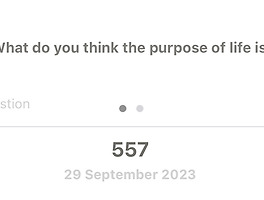
230927WED: Q555
Who is the owner of your life?
The question of who is the owner of our lives is a profound one, touching upon philosophical, ethical, and personal dimensions.
It prompts us to consider concepts of autonomy, responsibility, and the influence of external forces on our existence.
In a philosophical sense, many would argue that we are the owners of our lives.
This perspective is rooted in the concept of free will, which asserts that individuals have the capacity to make choices and decisions that shape the course of their lives.
From this standpoint, our actions, values, and beliefs are the driving forces behind our life's trajectory.
We possess the agency to set goals, make moral judgments, and determine our own path.
However, the question becomes more complex when we consider the various external factors that can influence our lives.
Society, culture, family, and even genetics all exert a significant influence on who we become and the opportunities available to us.
These external forces can shape our values, beliefs, and choices, sometimes to a profound degree.
For instance, the circumstances of our birth, such as our family's socioeconomic status or the country we are born in, can significantly impact the opportunities and limitations we face in life.
Moreover, ethical and moral perspectives play a role in this discussion.
Some argue that while we may have agency in our lives, we also have a responsibility to consider the impact of our choices on others and the world around us.
This perspective suggests that we are not the sole owners of our lives but rather stewards of our existence, with a duty to act in ways that are just, compassionate, and responsible.
Religious and spiritual beliefs further complicate the question.
Many faiths teach that our lives are gifts from a higher power, and as such, we are not the ultimate owners of our lives.
Instead, we are seen as custodians of our existence, accountable to a divine authority.
In the end, the answer to the question of who is the owner of our lives may be a complex and multifaceted one.
It likely varies from person to person and can depend on individual beliefs, values, and experiences.
Some may assert their autonomy and see themselves as the primary owners of their lives, while others may acknowledge the influence of external factors and embrace a more collective or spiritually guided perspective.
Ultimately, the concept of ownership in the context of our lives is a deeply personal and philosophical inquiry that invites introspection and reflection on our place in the world and our relationship to the forces that shape our existence.
Words 429 of 96391
Characters 2579 of 535713
Characters excluding spaces 2170 of 447077
'3_____Writing Practice > Question Diary (2202-)' 카테고리의 다른 글
| Question Diary 230929FRI: Q557 (0) | 2023.09.30 |
|---|---|
| Question Diary 230928THU: Q556 (0) | 2023.09.28 |
| Question Diary 230926TUE: Q554 (0) | 2023.09.27 |
| Question Diary 230925MON: Q553 (0) | 2023.09.26 |
| Question Diary 230924SUN: Q552 (0) | 2023.09.24 |



